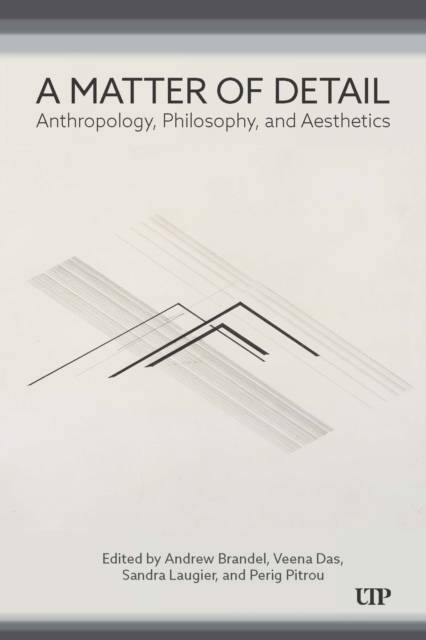
- Afhalen na 1 uur in een winkel met voorraad
- Gratis thuislevering in België vanaf € 30
- Ruim aanbod met 7 miljoen producten
- Afhalen na 1 uur in een winkel met voorraad
- Gratis thuislevering in België vanaf € 30
- Ruim aanbod met 7 miljoen producten
Zoeken
A Matter of Detail
Anthropology, Philosophy, and Aesthetics
Andrew Brandel, Veena Das, Sandra Laugier, Perig Pitrou
€ 72,45
+ 144 punten
Omschrijving
A Matter of Detail inspires new ways of thinking about detail by bringing anthropology, philosophy, art history, and aesthetics into direct conversation. Co-editors Brandel, Das, Laugier, and Pitrou challenge a long-standing assumption that the history of detail begins with European modernity and follows a teleological course from an object of scorn to a sign of the good. In its place, they offer a history of attention to detail that draws on classical and vernacular histories and traditions found in grammar, ritual, and poetics around the world. Emphasizing detail as a method and moving between its usage as a noun (detail) and a verb (detailing) enables them to tell stories about the reassembly of detail across accidents, contingencies, and unintended consequences.
From this vantage, the book argues that details are not always small and insignificant. Rather, there is a dynamic relationship between the minute and the grand, detail and surface, which makes the proliferation of details threatening to the idea of an authoritative and integrated imagination of the whole. This expanded context generates ways of conceiving detail as a conceptual and moral mode of self-formation and being toward others, both human and non-human.
From this vantage, the book argues that details are not always small and insignificant. Rather, there is a dynamic relationship between the minute and the grand, detail and surface, which makes the proliferation of details threatening to the idea of an authoritative and integrated imagination of the whole. This expanded context generates ways of conceiving detail as a conceptual and moral mode of self-formation and being toward others, both human and non-human.
Specificaties
Betrokkenen
- Auteur(s):
- Uitgeverij:
Inhoud
- Aantal bladzijden:
- 312
- Taal:
- Engels
- Reeks:
Eigenschappen
- Productcode (EAN):
- 9781487550646
- Verschijningsdatum:
- 25/11/2025
- Uitvoering:
- Hardcover
- Formaat:
- Genaaid
- Afmetingen:
- 152 mm x 229 mm
- Gewicht:
- 544 g

Alleen bij Standaard Boekhandel
+ 144 punten op je klantenkaart van Standaard Boekhandel
Beoordelingen
We publiceren alleen reviews die voldoen aan de voorwaarden voor reviews. Bekijk onze voorwaarden voor reviews.







